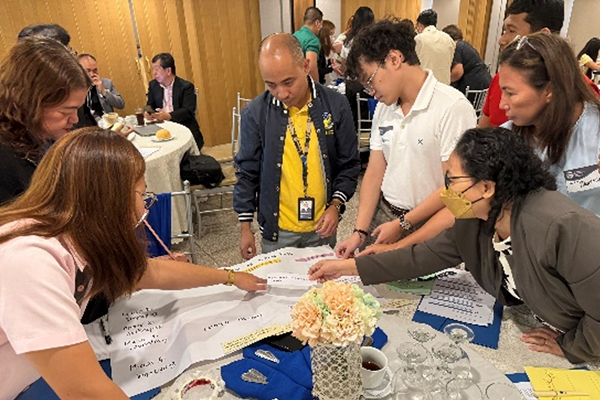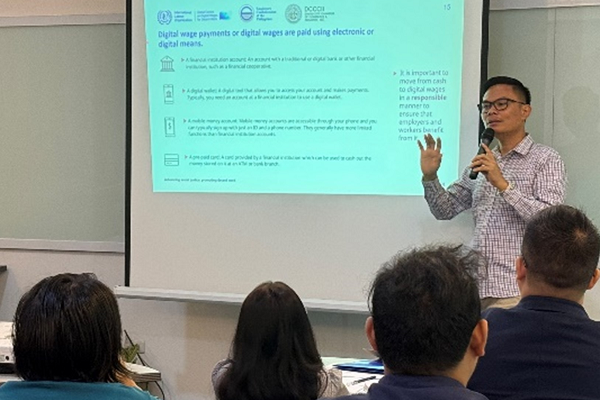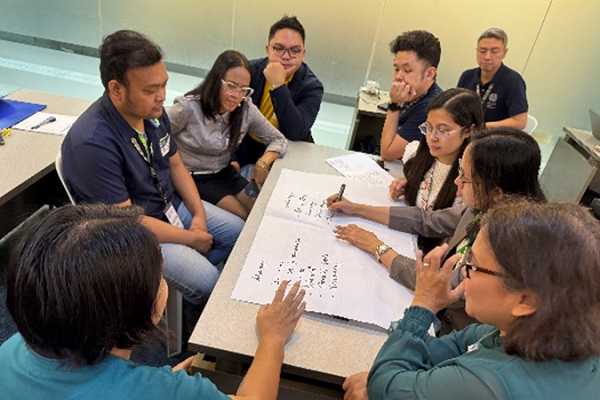Contact us: digitalwages@ilo.org
Empowering micro and small enterprises in the Philippines with responsible wage digitization

To support the broader digitalization goals for micro, small and medium-sized enterprises (MSMEs) in the Philippines, the ILO’s Global Centre on Digital Wages for Decent Work and its partner the Employers Confederation of the Philippines (ECOP) are implementing a training programme on responsible wage digitization for small enterprises. With more than half of the salaries in the private sector still being paid in cash in the country, the digitization of wages in the Philippines can enhance the efficiency, productivity and sustainability of its MSMEs.
To date, the Global Centre and ECOP, in cooperation with local chapters and partner business associations, conducted training sessions in four provinces – Cavite, Cebu, Davao and Pangasinan. Over 80 participants, mostly business owners and finance or human resource staff, gained valuable knowledge, learned new tools and tested strategies to successfully and responsibly digitize wage payments, benefiting both their enterprises and their workers.

Throughout the training, the participants engaged in individual exercises and case studies, allowing them to reflect and share insights with fellow enterprise owners and staff. They recognized the benefits of paying wages digitally, particularly the convenience, efficiency and security it provides. At the same time, they also acknowledged some challenges need to be addressed, such as unreliable broadband connectivity, insufficient network, inaccessible banks and ATMs, limited digital and financial literacy, and risks of cyber fraud.
The group activities built in the training programme encouraged each participant to share with others their experience in paying wages and, for some, dealing with banks. These were valuable as they learned about the roadmap to responsible wage digitization and its key activities, such asinternal process management, engagement of financial service providers and consultation with workers.

During the course, emphasis was especially given to support workers through the transition and doing due diligence when selecting a financial service provider (FSP). Through a role-playing activity involving management, an FSP and workers, the participants simulated a meeting on wage digitization within an enterprise and explored possible scenarios that could take place and how this could be possibly handled.
To enrich the discussion and facilitate better engagement among stakeholders, the Global Centre and ECOP invited officials from the local offices of the Bangko Sentral ng Pilipinas (the Philippine central bank), the Department of Trade and Industry and the Department of Labor and Employment. These officials and their representatives welcomed the promotion of responsible digital wage payments in their localities and has expressed their support to local enterprises who may need their assistance as they digitalize their businesses.
Following the Training of Trainers conducted in October 2023, this training programme on responsible wage digitization for small enterprises provides an overview of the use and benefits of digital payments for small enterprises, with a specific attention to digital wages; emphasizes the importance of a responsible transition; and guides the participants through the steps to implement this, including elements of human resource management such as setting up a payroll system, registering employees and issuing pay slips.
The Global Centre and ECOP will be carrying out more training and knowledge-sharing activities in the coming months for enterprises to learn from each other’s wage digitization journey.
